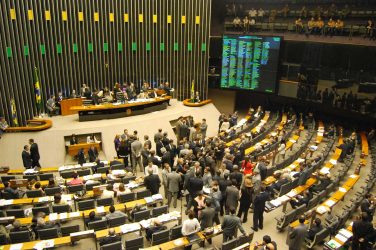The new Brazilian government of Jair Bolsonaro has shocked the liberal world with its right-wing views and efforts to block a progressive agenda for minorities and human rights.
In January, Brazil’s only openly gay congressman, Jean Wyllys, left politics – and the country – citing fears for his life and the current hostile climate against minorities.
But what if these threatening views were not just a temporary or minority aberration, but something far more long term, popular and widespread? In Brazil, a whole swathe of the media is now dedicated to proliferating conservative views and Christian evangelical values.
These websites, which share so-called “gospel news”, tell popular stories about anti-abortion activists and the “conversions” of gay men into straight men.
As the country’s Catholic majority shrinks, evangelicals are on the rise – 22.2% of Brazilians said they were evangelicals in 2010, up from 6.6% in 1980. Indeed, they are now the most influential evangelical community in South America. And much of the information they consume comes from gospel news websites.
I initially conducted research into these gospel news websites in 2008, when I found them to be growing in popularity and sophistication. A decade later, in 2018, some of them claimed to have as many as 20 million visitors a year.
As Brazil becomes more conservative – a 2016 survey revealed that 54% of Brazilians report having a high number of traditionally-conservative opinions, 5% more than in 2010 – this looks set to rise further.
A Rising Industry
Gospel news websites, such as Gospel Prime or Gospel +, have been building their readership for years. Their content purports to interpret the daily news, but their values are largely distinct from those of a secular news organization.
Expect stories with a strong biblical theme, about Israel or some new archaeological discovery. LGBT rights, abortion and the legalization of drugs are regularly framed as threats to the Brazilian way of life.
From 2008 to 2019, these websites expanded from obscure forums to professionalized media outlets. They have moderated their discourse and increased advertising revenues. There is even an Academy of Evangelical Bloggers, which is aimed at supporting the work of new content creators.
To understand their growth and trajectory matters because evangelical views can affect the opinions and the behavior of millions. They could also influence political decisions, from human rights to climate change, issues Bolsonaro has so far taken a hard line on.
For instance, their influence has arguably shaped the debate – or lack of it – around several crucial legal bills. For example, one senior Supreme Court judge publicly acknowledged the “discriminatory” nature of the silence in the Brazilian congress, which has hitherto prevented new laws criminalizing homophobia from coming into force.
Conservative and Connected
Gospel news websites often report both micro and macro issues as if in a closed community, one with an assumed “family agenda” that is conservative, anti-abortion, anti-LGBT. They cover relatively mundane church goings on and report on the everyday lives of evangelical politicians, but they also put their own spin on a range of topics, both local and international.
And you can see their message reflected in politics. When Damares Alves, Bolsonaro’s minister for women, family and human rights, who is also an evangelical preacher, for example, said “boys wear blue and girls wear pink”, she could have been writing a gospel news headline.
The controversial plan to move Brazil’s embassy in Israel to Jerusalem is another example of Bolsonaro’s government aligning itself with evangelical leaders – the US Trump administration, which also has strong ties to evangelicals, has already moved its embassy in Israel to Jerusalem.
Influencing Decisions
The problem with gospel news is not the lack of factual basis in stories, but its dogmatic prioritization of certain facts and the way this might affect fragile communities and the trajectory of the country’s politics.
For example, gospel news websites have been quick to campaign for Marco Feliciano to chair the commission on human rights in congress. An evangelical preacher of strong opinions, Feliciano has taken many inflammatory positions.
He once said that “God shot John Lennon”, among a range of anti-gay remarks, some of which he said while chairing the same commission in 2013. His presence is divisive, but he gets praise on these websites for what he says or does.
Of course, these gospel news websites fulfil an important role for evangelicals, giving them the media representation they want. For decades, followers of the main evangelical churches have been targeted in Brazil as fanatics, in many cases by the mainstream media.
But their news values clearly clash with a more progressive agenda that supports the emancipation and empowerment of minorities. Consequently, undemocratic messages deserve more attention – and should be made more accountable – in such a diverse society as Brazil’s.
Helton Levy is a research associate at City, University of London
This article was originally published in The Conversation. Read the original article here: http://theconversation.com/gospel-news-how-evangelical-websites-shape-the-views-of-millions-of-brazilians-112440





